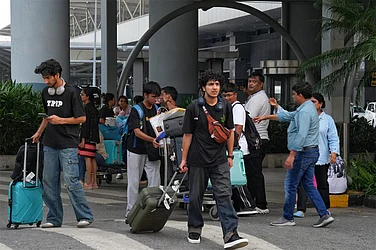A parliamentary committee has stressed on the need to introduce chapters on drug addiction, its consequences, and de-addiction measures in school and college curricula.
By targeting school and college students with proper counselling and awareness programmes, the panel said, the country aims to foster a society that understands drug abuse as a public health concern rather than a character flaw.
This initiative aligns with the broader efforts to strengthen drug demand reduction and rehabilitation measures across the nation, according to the Parliamentary Standing Committee on "Drug Abuse Among Young Persons-Problems and Solution". Its report was tabled in Lok Sabha on Thursday.
"Awareness can also be increased if education curriculum include chapters on drug addiction, its impact and also on de-addiction. Proper counselling for school and college students need to be available at hand," the panel, headed by BJP's Lok Sabha member Rama Devi, proposed.
In response to drug trafficking and substance abuse problems in India, the committee has proposed a series of measures to address these comprehensively.
It highlighted the urgent need for advanced technology and surveillance systems at ports, airports, and borders to curb drug trafficking from countries such as Ethiopia, Nigeria, Afghanistan, Nepal, Myanmar, and Pakistan.
To foster better collaboration and coordination among various stakeholders, the committee emphasised the importance of the Apex Committee of Narcotics Coordination Centre, set up by the Ministry of Home Affairs in 2016. Regular meetings and reviews are expected to ensure efficient execution of responsibilities, it said.
Due to the Covid pandemic, some de-addiction centres experienced reduced numbers of beneficiaries, the Department of Social Justice and Empowerment informed the panel.
The committee expressed concern over the widespread use of drugs among children aged 10-17 and adults aged 18-75 in several states, including Punjab, Haryana, Delhi, Uttar Pradesh, Odisha and Maharashtra.
It stressed on the need for preventive education, awareness campaigns, and counselling programmes to address the issue effectively.
A comprehensive survey conducted by the National Drug Dependence Treatment Centres (NDDTC) in 2018 had revealed shocking statistics, estimating that over 37 crore adults in the age group of 18-75 were using drugs and alcohol, the committee said.
In response to this alarming data, the National Action Plan for Drug Demand Reduction (NAPDDR) Scheme was formulated to create awareness, provide rehabilitation, and reduce drug demand, it said.
To combat drug addiction effectively, the committee recommended periodic surveys by the NDDTC to stay updated on the drug abuse situation and revise or create new schemes for rehabilitation and demand reduction. The study's scope should also extend to assessing the impact of drug abuse on society as a whole, it said.
The committee stressed on the importance of timely utilisation of allocated funds for NAPDDR. Budgetary allocations for previous years were not fully utilised, partly due to delays in approval and implementation, it said.
It urged the Department of Social Justice and Empowerment to expedite the allocation and utilisation of funds to achieve the desired results.
-With PTI Input






















